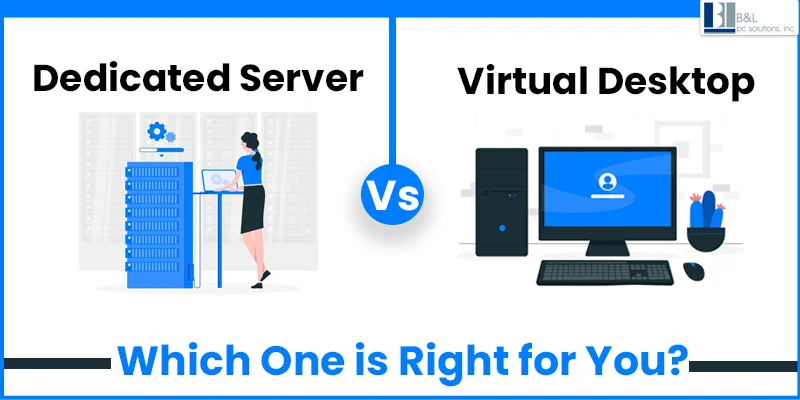
It is relatively puzzling to select the most appropriate IT architecture while deciding between a dedicated server vs virtual desktop. There is strength in each choice, although they prove the best for sensitive intentions. This blog post will discuss a dedicated server and a virtual desktop, when you should use each solution, and how to decide what to use in your business. You can identify which solution suits you at the end of this discussion.
Why It Matters for Your Business
The decision between a dedicated server and a virtual desktop can make a huge difference in your business's execution. Dedicated servers are high-performance, high-security servers, which makes them suitable for such operations. That is why virtual desktops can be very flexible. They also bring significant cost-saving opportunities and support for remote work.
Selecting the proper solution is the foundation for properly establishing an IT platform suited to the company's growth rate, functional intensity, and protection standards.
What Is a Dedicated Server?
A dedicated server refers to a physical machine that is leased or owned by an individual or organization. It is entirely dedicated to a single client or company, meaning you have full control over the server's resources such as CPU, RAM, storage, and bandwidth.
Key Features of Dedicated Servers
-
High Performance: These servers are high-speed and efficient because a single client controls all the resources. This is especially important when hosting large databases, enterprise applications, or websites that attract significant traffic.
-
Customization: Businesses can design the hardware and software to suit their needs. For instance, organizations can personalize applications, decide on system software, and adapt parameters to enhance their performance in a specific way.
-
Enhanced Security: This is much more secure because no other user occupying that server can access the information. The possibility of providing particular security measures and physical isolation are the main reasons dedicated servers are popular among industries where compliance with standards, such as finance or healthcare, is critical.
-
Reliability: Dedicated servers eliminate the chances of downtime and always operate optimally due to their business efficiency.
Use Cases:
- Hosting large websites or applications that require significant resources.
- Running custom software or applications that need full control of the server environment.
- Database hosting for large or complex databases that require dedicated resources.
- Virtualization for running virtual machines or containers on the server.
Pros and Cons of Dedicated Server
|
Real-Life Example
Consider an e-commerce site like Amazon, which handles millions of tiny interactions daily and must be available around the clock. A dedicated server allows the platform to accommodate large proportions of traffic and deliver optimal user experience during peak sales occasions such as Black Friday.
Read More Blog : Virtual Servers for Your Tax Accounting Firm: Improve Efficiency
What Is a Virtual Desktop?
A virtual desktop refers to a virtualized desktop environment that is hosted on a server or in the cloud. Users access a virtual desktop that looks and behaves like a traditional desktop, but it's hosted remotely.
Key Features of Virtual Desktops
- Accessibility: These desktops enable users to use their working environment from any location, such as the workplace, home, or while on a business trip. This accessibility has increased efficiency and accommodates most organizations' work-from-home policies.
- Cost-Effective: As most solutions are billed monthly based on usage, virtual desktops proved cost-effective for small and medium enterprises. They do not require costly hardware acquisition and use, which usually entails more maintenance expenses.
- Scalability: Virtual desktops are flexible since companies can easily add or release more or fewer virtual desktops. This flexibility is most useful when staff numbers vary frequently in practice at the workplace.
- Centralized Management: From a single central location, the application can be updated, security monitored and altered, and data backups coordinated, making maintenance and operation much more manageable.
Use Cases:
- Remote work environments: Ideal for companies where employees need access to a consistent desktop environment from different locations.
- BYOD (Bring Your Own Device) policies: Allows employees to access a secure corporate environment from personal devices.
- Software testing or app development: Provides isolated environments for testing and development.
- Educational environments: Used to deliver a uniform desktop environment to students for access to specific applications and resources.
Pros and Cons of Virtual Desktop
|
Real-Life Example
Virtual desktops can allow employees to work on significant utilities and documents quickly, such as in a marketing agency with a remote team. This centralized approach enhances employee coordination, regardless of where they work.
Read More Blog : VPN vs. Virtual Desktop: What's the Difference in 2025?
Key Differences of Dedicated Server vs Virtual Desktop
It will be easier to determine the best solution for your enterprise by comparing a dedicated server and a virtual desktop. Here's a detailed comparison:
| Feature | Dedicated Server | Virtual Desktop |
|---|---|---|
| Hosting | Physical machine hosted on-premise or in a data center. | Cloud-hosted on shared infrastructure. |
| Performance | Exclusive, high performance for demanding workloads. | Shared resources; suitable for moderate tasks. |
| Cost | Higher due to dedicated resources. | Lower with subscription-based pricing. |
| Scalability | Limited by physical hardware. | Easily scalable in the cloud. |
| Security | Provides physical and network isolation. | Relies on cloud provider’s robust security protocols. |
| Flexibility | Requires on-site management. | Accessible from anywhere via the internet. |
Real-Life Scenarios: Choosing Based on Your Needs
To help you decide, let's explore some real-life scenarios where one option may be better than the other:
Scenario 1: E-commerce Business Growth
Problem: E-commerce businesses tend to have high traffic volumes, and due to their fast-growing business level, their availability should be around the clock.
Solution: A dedicated server also gives the necessary power and stability for a thriving online store, thus eliminating probable slow loading and other indicators of overload during periods of increased workload.
Scenario 2: Remote Marketing Team
Problem: This remote workforce collaborates effectively as a team for a marketing agency, requiring shared tools, software, and files.
Solution: Desktops provide team members with a means of communication and allow them to access shared resources while working in different places.
Scenario 3: Budget-Conscious Startup
Problem: Such a business requires an effective, economical, and flexible solution for IT development within a startup company.
Solution: Virtual desktops offer elasticity, cost savings, and the convenience of a scaling system according to the startup's needs.
The Procedure for Solution Selection : Dedicated Server vs. Virtual Desktop
When deciding between a dedicated server vs virtual desktop, consider these steps to ensure you make an informed choice:
Assess Your Business Needs:
It is crucial to identify and define your present and future load and performance expectations and the needs of future IT users.
Evaluate Your Budget:
Considering costs, expenses incurred during the early stage are only one part of the total costs incurred throughout the project life cycle. Most dedicated servers charge a one-off fee, while virtual services are also charged based on the number of users or monthly.
Understand Your Industry Requirements:
Some industries, such as healthcare and finance, involve multiple users utilizing applications, necessitating enhanced security and full compliance, which can be achieved through dedicated servers.
Consult an IT Expert:
Consult with IT service company Long Island, which can offer personal advice and help you find the right solution for your type of usage.
Still not sure which IT solution is right for your business? You can consult B&L PC Solutions for reliable IT Managed Service Provider Long Island and best recommendations for choosing the best suitable option for your business.
Conclusion
While choosing dedicated servers vs. virtual desktops has numerous advantages based on various conditions, the best option depends on a specific criterion. Dedicated servers are helpful for companies that need lots of power, reliability, and security when hosting.
At the same time, virtual desktops are suitable for businesses that value mobility, remote environments, and low cost. It is wise to take your time to assess your business needs, your available financial capital, and your potential for business growth before you decide on a software solution.
Are you ready to take your IT setup to the next level? Let B&L PC Solutions help you identify and utilize IT support services on Long Island that address your organization's goals and needs.
Frequently Asked Questions
1. What factors make a dedicated server different from a virtual desktop?
A dedicated server is a stand-alone server owned and controlled by one company, while a virtual desktop is an application that can be run on any computing device.
2. Should small businesses pay for a dedicated server?
Yes, but only when the circuit needs high speed and total application control. Virtual desktops are much more suitable for less money.
3. Can virtual desktops be used for demanding applications?
Dedicated servers are better suited for handling resource-intensive tasks like processing databases or managing large websites.
4. Which is more secure: licensed software, dedicated servers, or virtual desktops?
Dedicated servers offer the highest security, while virtual desktops require cloud security, suitable for most businesses.
5. What should I do to choose the right option for my business?
Assess your business requirements, viability, financial limit, and your business's capacity for growth. You should also seek advice from an IT service company to make the right decision.
Tags: Dedicated Server vs. Virtual Desktop, Dedicated Server?, Virtual Desktop, What Is a Dedicated Server?, What Is a Virtual Desktop?





